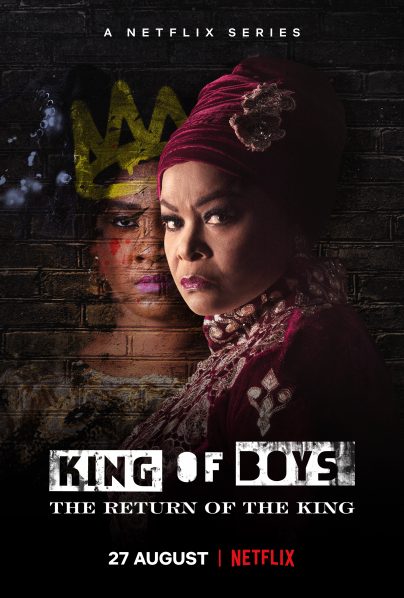KING OF BOYS: THE RETURN OF THE KING, EPISODE 2 “A WOUNDED LION IS STILL A LION” REVIEW
by Eke Kalu Everyone’s favorite adage-spewing, tongue-lashing, hair-raising, original Lagos gangster is back. And she only wants one thing. Well, she wants two things, but all more of the same. Power. It’s the same thing she wanted in the original King of Boys film. As the already established king of the Lagos underworld, she was desperate for the political spotlight. Whatever lessons on greed from the first film seem to have been quickly forgotten, she’s still gunning for the same thing that put two of her beloved children in a box. Only this time, after five years away, she’s an outsider on two fronts: her beloved ‘King of boys’ table (they brought the chair back) and the political tillage. Lagos be damned. Second time just might be the charm? The second episode – A Wounded Lion is still a Lion – picks up not too far from where the first episode left off. Eniola has declared her intentions to both run for the Governor of Lagos state and reclaim her throne back from the new king, Odudubariba. Played by Charles “Charlyboy” Oputa” Odudubariba’s most menacing quality is probably his choice of clothes. A deliberate exercise in colors and vanity from the costume department. They stand in contrast to the moderate garbs of the other members of the table. He’s like a peacock, fluttering and demonstrating, all too aware that he’s not the real thing. Five years after Eniola abandoned her throne, the table is divided. Some are still unconvinced of their loyalty to this new King. Odudubariba refuses to make a move on her when she’s arguably at her weakest. Instead, he declares that she must first willingly announce him king, seeking validation from the original King of Boys. Eniola Salami’s mythos has always bordered on godhood, but the actions that provoke this lore frequently skirt the ridiculous. Perhaps, that is what it truly means to be a god among men, to be exasperated at their shortcomings, to belittle and seldom fail to remind them of whom they dare converse with, to ponder why you don’t just murder the whole lot of them. Much so that the episode’s dialogue becomes entirely entrapped in circles of parley about kings and their thrones, about vain proverbs, about murder and revenge, darkness and punishment. Laburu may be prophet and fulfillment of her vengeance, but she is in very equal parts a skillful converter to her trusted religion of fear. For all the criticism fired at the first film for it’s lack of nuance, thanks to Sola Sobowale’s exaggerated methods, she’s never been afraid to use the space around her. In this, she excels in the way that her co-actors do not. They’re too rigid and unfeeling, all the supposed expressions of nuance in grimace and heaviness manifesting in still, sunken frames, never finding life in their movements. There’s a scene where in frustration, Eniola Salami darts in and out of the frame. Deyemi Okanlawon’s insufferable Mr. Fashina stays rooted to the edge of his seat and Titi Kuti’s Ade Tiger lurks likes a mannequin in the background. The camera takes a neutral stance and does well to track her movements but as with much of the scenery in this episode, refuses to explore beyond the conventional. This, coupled with the fast-paced nature of the footage, gives much of this episode a claustrophobic feeling. As we jump from one scene to the other, the failed promise of something more can’t help but linger. Eniola is running for the gubernatorial elections on an independent ticket, and her politics appears to be garbled in a ‘them versus us’ narrative, which unfortunately has always been dangerously enough for the Nigerian electorate. The seeming ridiculousness of the whole ordeal should normally be jarring for any viewer, but given the knowledge that this isn’t altogether too far from what happens in real life, it borders on amusing and slips often into caricature. Only for obvious reasons, it ignores some of the more real nuances of Lagos politics. As a result, she spends much of the episode trying to source for an endorsement from two staples of Lagos politics. Religion and the markets. In front of her, listening to her lofty proposals, are RMD’s tired sketch of a character in Reverend Ifeanyi and the influential Iya Oloja. Both attempts fail rather dramatically as Eniola finds that after five years, allies will not be found so easily. Her frustration is somewhat manifest in the hallucinations from her younger self, still played by Toni Tones. Her only advice seems to be to murder everyone, of course, described in much more graphic detail. Another character born of the exaggerated ilk is Efa Iwara’s Dapo. An idealistic journalist for “The Conscience Newspaper ” who has no problem disappointing his kid in one frame and eagerly jumping into work in the next. It appears to be a recurring theme amongst Nollywood films that attempt to imagine the utter chaos that is the Nigerian polity to caricature the youthful zeal of Nigerian patriotism. We saw this same fervor with Enyinna Nwigwe’s by-the-book Ike from 4th Republic and even the original King of boys’ Nurudeen Gobir (Paul Sambo). He doesn’t make an appearance in this episode, but we learned from the last that he’s now the head of the NCCC. These characters spend much of their time on screen relaying the importance of their work to some father figure like Oga at the top, who like many viewers, has seen enough of Nigeria to advise them of the futility of their efforts. So, It seems like something more of an inside joke from Kemi Adetiba when Dapo tries to do the same. Unfortunately, Dapo isn’t in on it. In between desperately trying to convince his boss of the need for his big story, Dapo also does a little bit of convincing with his wife on why he’s not a terrible father. He showed up two days late for his son’s birthday and has a habit of

